in Thoreau’s Journal:

The reflections are perfect.

in Thoreau’s Journal:

The reflections are perfect.
in Thoreau’s Journal:
I have come out this afternoon a-cranberrying, chiefly to gather some of the small cranberry, Vaccinium Oxycoccus, which Emerson says is the common cranberry of the north of Europe. This was a small object, yet not to be postponed, on account of imminent frosts, i.e., if I would know this year the flavor of the European cranberry as compared with our larger kind. I thought I should like to have a dish of this sauce on the table at Thankgiving of my own gathering.
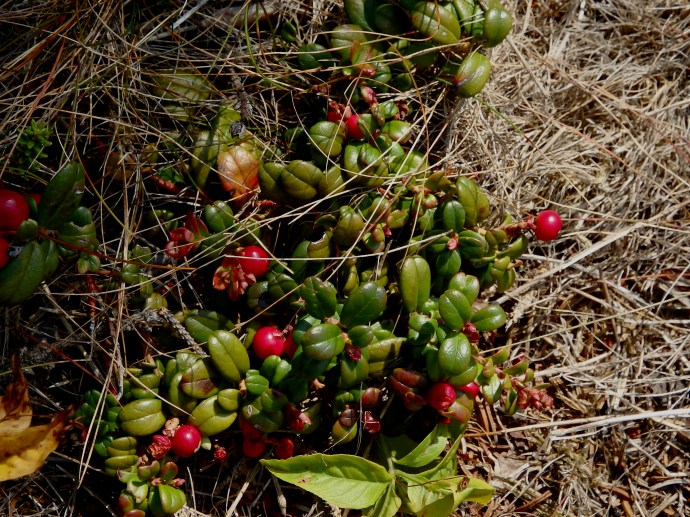
I could hardly make up my mind to come this way, it seemed so poor an object to spend the afternoon on. I kept foreseeing a lame conclusion—how I should cross the Great Fields, look into Beck Stow’s, and then retrace my steps no richer than before. In fact, I expected little of this walk, yet it did pass through the side of my mind that somehow, on this very account (my small expectation), it would turn out well, as also the advantage of having some purpose, however small, to be accomplished, —of letting your deliberate wisdom and foresight in the house to some extent direct and control your steps. If you would really take a position outside the street and daily life of men, you must have deliberately planned your course, you must have business which is not your neighbors’ business, which they cannot understand. For only absorbing employment prevails, succeeds, takes up space, occupies territory, determines the future of individuals and states, drives Kansas out of your head, and actually and permanently occupies the only desirable and free Kansas against all border ruffians. The attitude of resistance is one of weakness, inasmuch as it only faces an enemy; it has its back to all that is truly attractive. You shall have your affairs, I will have mine. You will spend this afternoon in setting up your neighbor’s stove, and be paid for it; I will spend it in gathering the few berries of the Vaccinium Oxycoccus which Nature produces here, before it is too late, and be paid for it also after another fashion. I have always related unexpected and incalculable advantages from carrying out at last, however tardily, any little enterprise which my genius suggested to me long ago as a thing to be done, —some step to be taken, however slight, out of the usual course.
How many schools I have thought of which I might go to but did not go to! Expecting foolishly that some greater advantage or schooling would come to me! It is these comparatively cheap and private expeditions that substantiate our existence and batten our lives, as, where a vine touches the earth in its undulating course, it puts forth roots and thickens its stock. Our employment generally is tinkering, mending the old worn-out teapot of society. Our stock in trade is solder. Better for me, says my genius, to go cranberrying this afternoon for the Vaccinium Oxycoccus in Gowing’s Swamp, to get but a pocketful and learn its peculiar flavor, aye, and the flavor of Gowing’s Swamp and of life in New England, than to go consul to Liverpool and get I don’t know how many thousand dollars for it, with no such flavor. Many of our days should be spent, not in vain expectations and lying on our oars, but in carrying out deliberately and faithfully the hundred little purposes which every man’s genius must have suggested to him. Let not your life be wholly without an object, though it be only to ascertain the flavor of a cranberry, for it will not be only the quality of an insignificant berry that you will have tasted, but the flavor of your life to that extent, and it will be such a sauce as no wealth can buy.
Both a conscious and an unconscious life are good. Neither is good exclusively, for both have the same source. The wisely conscious life springs out of an unconscious suggestion. I have found my account in traveling in having prepared beforehand a list of questions which I would get answered, not trusting to my interest at the moment, and can then travel with the most profit. Indeed, it is by obeying the suggestions of a higher light within you that you escape from yourself and, in the transit, as it were see with the unworn sides of your eye, travel totally new paths. What is that pretended life that does not take up a claim, that does not occupy ground, that cannot build a causeway to its objects, that sits on a bank looking over a bog, singing its desires?
However it was not with such blasting expectations as these that I entered the swamp….
I enjoyed this cranberrying very much, notwithstanding the wet and cold, and the swamp seems to be yielding its crop to me alone, for there are none else to pluck it or value it….I have no doubt I felt richer wading there with my two pockets full, treading on wonders at every step, than any farmer going to market with a hundred bushels which he has raked, or hired to be raked….I would gladly share my gains, take one, or twenty, into partnership and get this swamp with them, but I do not know an individual whom this berry cheers and nourishes as it does me….
I seem to have reached a new road, so wild a place that the very huckleberries are hairy and were inedible….What’s the need of visiting far-off mountains and bogs, if a half-hour’s walk will carry me into such wildness and novelty?
It is in vain to dream of a wildness distant from ourselves. There is none such….
A cold white horizon sky in the north, forerunner of the fall of the year. I go to bed and dream of cranberry-pickers far in the cold north. With windows partly closed, with continent concentrated thoughts, I dream. I get my new experiences still, not at the opera listening to the Swedish Nightingale, but at Beck Stow’s Swamp listening to the native wood thrush.
Wading in the cold swamp braces me. I was invigorated, though I tasted not a berry. The frost will soon come and smite them on the surface of the sphagnum….
Better it is to go a-cranberrying than to go a-huckleberrying. For it is cold and bracing, leading your thoughts beyond the earth, and you do not surfeit on crude or terrine berries. It feeds your spirit, now in the season of white twilights, when frosts are apprehended, when edible berries are mostly gone….
I would fain improve every opportunity to wonder and worship, as a sunflower welcomes the light.
August 29, 1854 in Thoreau’s Journal:
Early for several mornings I have heard the sound of a flail — It leads me to ask if I have spent as industrious a spring & summer as the farmer—& gathered so rich a crop of experience—
August 29, 1858 in Thoreau’s Journal:
All these high colors in the stems and leaves and other portions of plants answer to some maturity in us. I presume if I am the wiser for having lived this season through, such plants will emblazon the truth of my experience over the face of nature, and I shall be aware of a beauty and sweetness there.
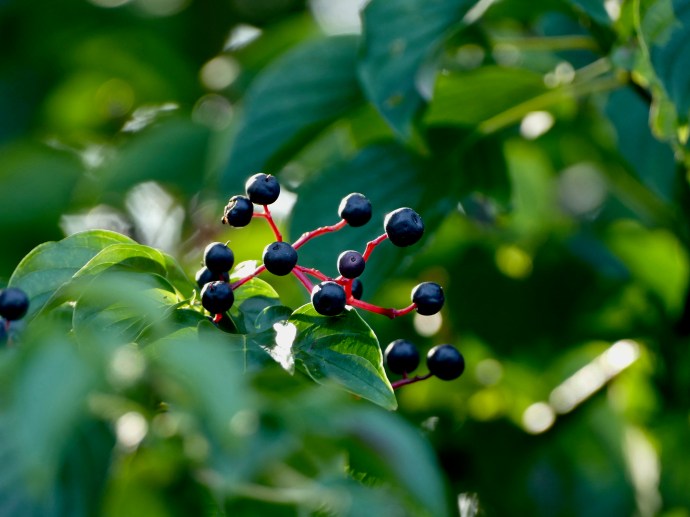
Now the red osier berries are very handsome along the river—over hanging the water—for the most part pale blue mixed with whitish—part of the pendent jewelry of the season. The berries of the alternate leaved Cornel have dropped off mostly. The white berried & red osier are in their prime. The other 3 kinds I have not seen– The viburnums dent. & nudum are in the prime—The sweet Viburnum not yet purple & the maple leaved still yellowish. Hemp still in blossom.
in Thoreau’s Journal

The leaves of some young maples in the water about the pond are now quite scarlet—running into dark purple red.
[August 25, 1852 in Thoreau’s Journal: At length, before sundown, it begins to rain. You can hardly say when it began, and now, after dark, the sound of it dripping and pattering without is quite cheering. It is long since I heard it. One of those serious and normal storms, not a shower which you can see through, something regular, a fall (?) rain, coincident with a different mood or season of the mind, not a transient cloud that drops rain. Methinks the truly weather-wise will know themselves and find the signs of rain in their own moods, the aspect of their own skies or thoughts, and not consult swallows and spiders. I incline always [to] questions about the weather without thinking. Does a mind in sympathy with nature need a hygrometer?]

August 26, 1852 in Thoreau’s Journal:
Rain Rain.
in Thoreau’s Journal:

Yesterday was a hot day—but oh, this dull cloudy breezy thoughtful weather in which the creak of the cricket sounds louder!
in Thoreau’s Journal:
The year is but a succession of days, and I see that I could assign some office to each day which, summed up, would be the history of the year.

Everything is done in season, and there is no time to spare.
in Thoreau’s Journal:
Now that birds & flowers fall off, fruits take their places and young birds in flocks– What a list of bright colored—sometimes venomous looking berries spot the swamps & copses amid changing leaves! For colors they will surpass the flowers methinks— There is something rare—precious—& gem like about them.

Now is their time & I must attend to them— Some like grapes we gather & eat but the fairest are not edible.
in Thoreau’s Journal:
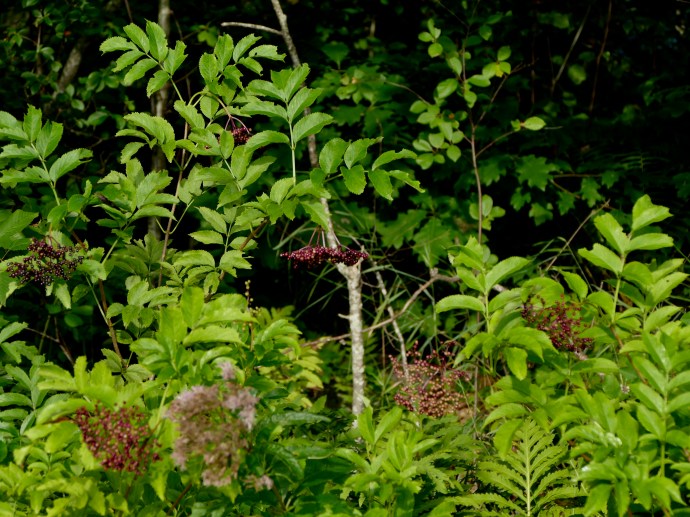
The elder bushes are weighed down with fruit partially turned and are still in bloom at the extremities of their twigs.

in Thoreau’s Journal:
Fruits now take the place of flowers to some extent. These brilliant colored fruits flower like….The sound of the crickets gradually prevails more and more, I hear the year falling asleep….The high blackberries by the road side are sweet but covered with dust….The bitter-sweet berries now bright red still handsomer than the flowers. The barberries are turning.

in Thoreau’s Journal:

Prinos berries have begun to redden.
in Thoreau’s Journal:

The skunk cabbages—& the trilliums both leaves & fruit are many flat prostrate—the former decaying and all looking as if early frosts had prevailed….

The red-stemmed (?) cornel berries…
in Thoreau’s Journal:
Elizabeth Hoar shows me the following plants which she brought from the Wht Mts the 16th ult. Chiogenes hispidula creeping snow-berry also called Gaultheria & also vaccinia hispidula—in fruit. — with a partridge berry scent & taste. Taxus Canadensis Ground hemlock with red cup shaped berries very handsome & remarkably like wax or red marble. Planthera orbiculata remarkable for its watery shining leaves fast on the ground while its spike of flowers rises perpendicular—suggesting as she said respose & steadiness amid the prostrate trunks—& you could not avoid seeing it any more than a child in blossom. Oxallis acetosella in blossom. Arenaria Groenlandica also in bloom in tufts like houstonia. Lonicera ciliata probably with a double red fruit.
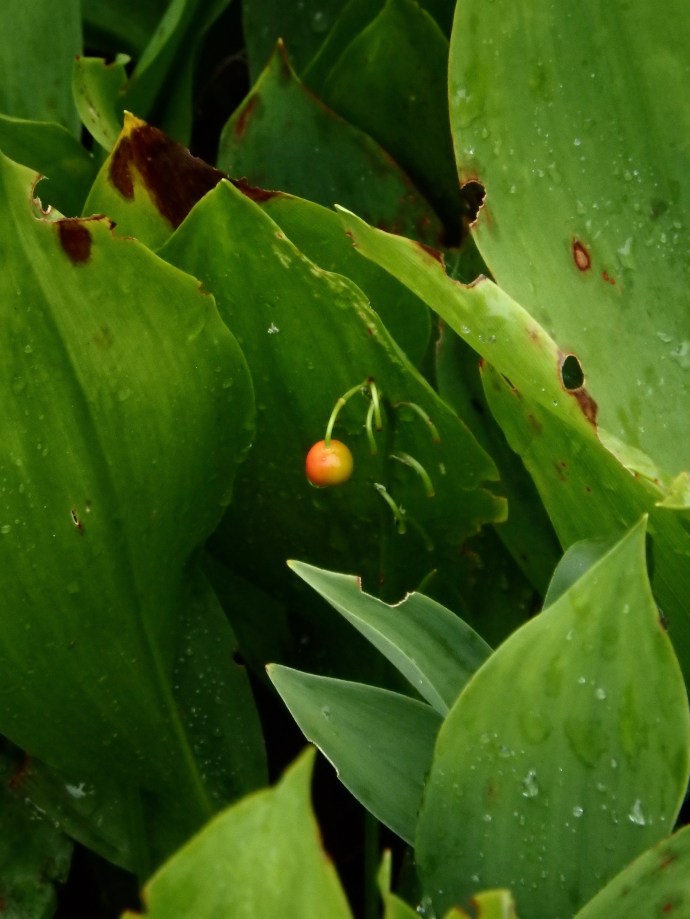
She also brought Lichens & mosses & convallaria berries which she gathered at the flume in Franconia—the latter red ripe hanging from the axils of the leaves—affected me—reminding me of the progress of autumn in the north—& the other two were a very fit importation still dripping with the moisture the water of the flume. It carries you indeed into the primitive wood. To think how in those wild woods now hang these wild berries in grim solitude as of yore—already scenting their autumn— A thousand years ago this convallaria growing there—its berries turning red as now & leaves acquiring an autumnal tint.
in Thoreau’s Journal:
This mornings red, there being a misty cloud there—is equal to an evening red.
The woods are very still…

The white cornel berries are dropping off before they are fairly white.

in Thoreau’s Journal:

I must look for the Rudbeckia which Bradford says he found yesterday behind Joe Clarks.
in Thoreau’s Journal:
That clear ring like an alder locust is it a cricket? For some time past is a sound which belongs to the season. — autumnal. Here is a 2nd crop of clover almost as red as the 1st. The swamp blackberry begins. Saw a blue-heron on the meadow—
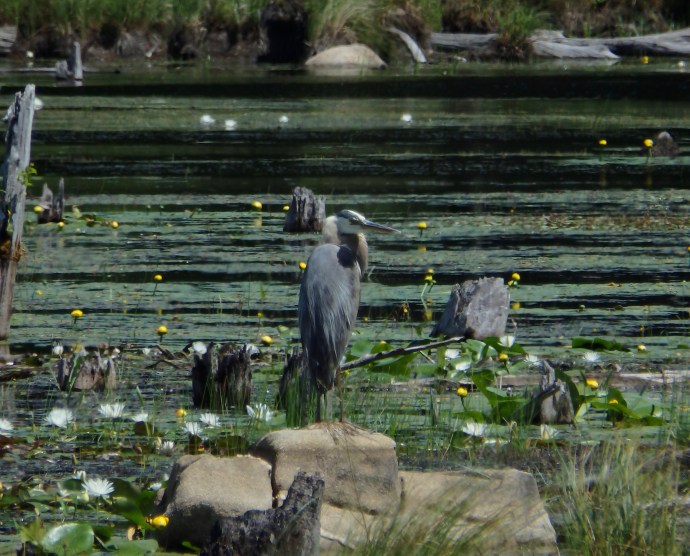
in Thoreau’s Journal:
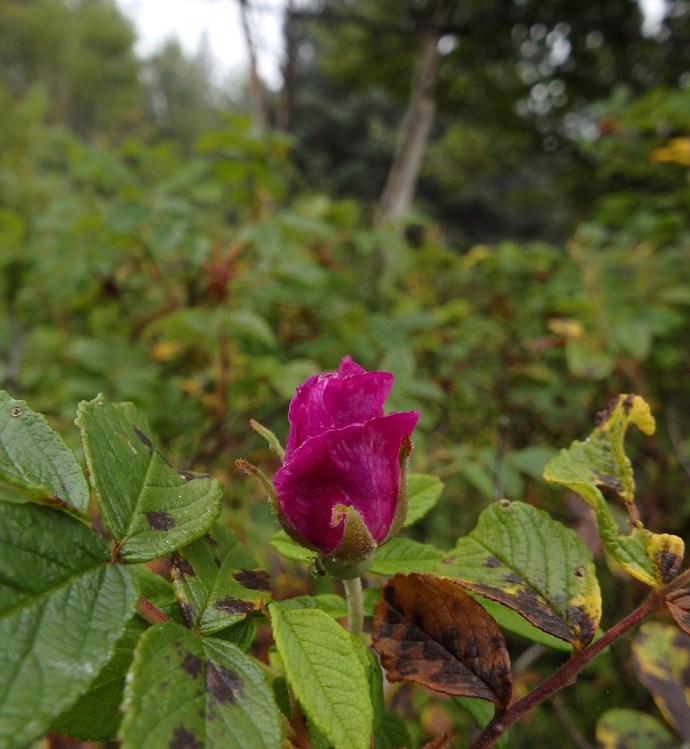
Viburnum dentatum berries blue. Saw a rose still—
There is such a haze that I cannot see the mts
in Thoreau’s Journal:

I hear that the coralhoriza odontorhiza (coral root) is out.
in Thoreau’s Journal:

I think that I begin to see a few more hawks than of late.
You must be logged in to post a comment.